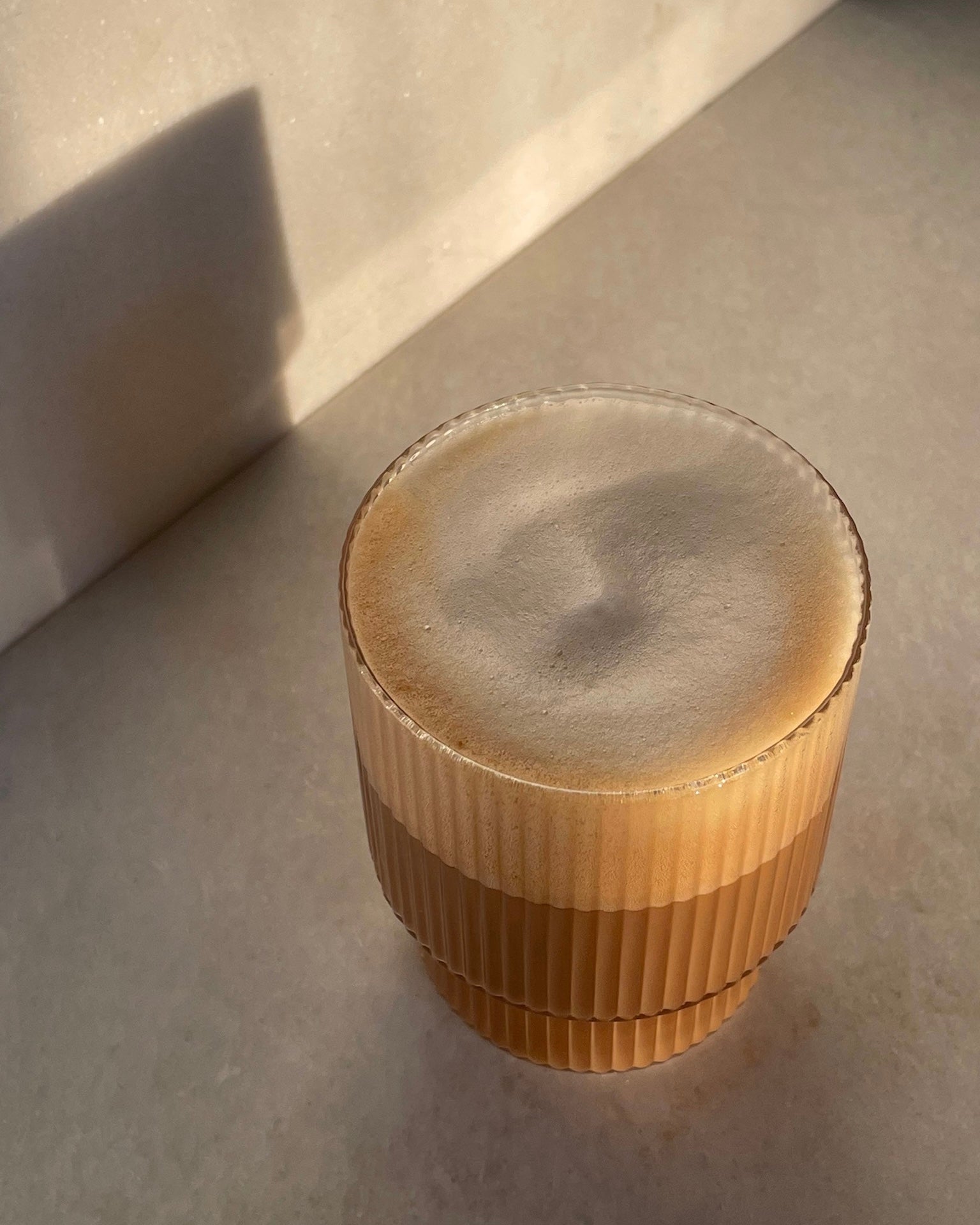In recent years, we have received hundreds of messages from women who have reduced and in some cases eliminated caffeine and with it experienced positive effects on their menstrual cycle such as more regular and stronger ovulation, less menstrual pain, anxiety and PMS as well as improved sleep quality . This has inspired many to want to try cutting back on caffeine themselves .
Caffeine and the menstrual cycle
We know that just the thought of quitting caffeine can feel impossible as many of us have lived with caffeine as an ingrained routine in everyday life. Therefore, we thought we would share concrete and simple tips that can facilitate the transition to less caffeine in everyday life. But we'll start at the beginning – how does caffeine work and why might it be linked to some period-related symptoms?
Caffeine is a controversial topic and currently there is not much research on caffeine linked to the menstrual cycle. However, we have seen an interesting wave of women who in recent years have testified how a caffeine-free lifestyle helped them reduce or completely get rid of period-related problems such as PMS, PCOS, irregular ovulation and missed periods. What this may have to do with is that caffeine triggers our stress hormones. Stress of various kinds has been shown to have negative effects on the menstrual cycle and stress induced by caffeine is no exception, especially when added to an already stressed body and lifestyle. If you are curious to read more about other women's experience of caffeine, a tip is to take a look at our story highlight "Caffeine" on Instagram .
How does caffeine actually affect the menstrual cycle and our hormones?
The reason why caffeine can have an effect on the menstrual cycle is that caffeine stimulates our stress hormones, cortisol and adrenaline. When we're already stressed, whether it's external or internal stress, caffeine can become another stressor that can wreak havoc on the female sex hormones. The body is wise and will always choose survival , i.e. dealing with the stress, over fertility, i.e. producing our sex hormones.
This does not mean that caffeine has negative effects for all women or that it always has a negative impact. How well your body copes with caffeine depends on how well you can break it down, which enzymes you have more or less of, what your lifestyle looks like and how much stress you are exposed to in general (both internal and external stress). We are all different, which means that we also react differently to caffeine.
How do I stop caffeine or coffee?
We know that many people think about cutting down or trying to exclude caffeine to see if it can have a positive effect on the menstrual cycle and hormones. If you experience various symptoms linked to the menstrual cycle such as mood swings, worry and anxiety before your period, missed periods, irregular ovulation, difficulty getting pregnant or menopausal symptoms, it may be interesting to try excluding caffeine for a few cycles to see if you experience any positive difference.
We know, now you might be thinking "how am I even going to function without my coffee in the morning" or "you have no idea how I get by without my caffeine"? It may sound harsh to say, but often what we are most attached to and feel the most resistance to quitting is what we need to quit the most. We also know that you can feel a bit like a zombie when you stop caffeine, feel increased hunger, more irritated, get headaches and various symptoms. However, the physical and emotional changes you go through are temporary – they will pass once the caffeine leaves your body, your hormones begin to balance again, and your body feels safe. Best of all, you will most likely achieve a new dimension of well-being once you get past the first few days or weeks when your body has stepped into the parasympathetic nervous system – a state where the body feels safe and calm.
Here are some concrete tips that can make it easier to quit caffeine
You need to know your why
First of all, when we make changes it is important to know why we are doing it. Have a clear intention – it will help you not fall back into old patterns when the cravings are huge or when you start to feel the side effects of going without caffeine for a few days. You know why you're doing it - stick to it.
Change to something else that doesn't give the body a stress boost
It is always easier to break a habit by replacing it with something else. Fill your morning cup with another alternative that tastes like coffee, such as Chicca Roast or why not a good tea or matcha latte. If energy drinks are your challenge, you can try switching to kombucha, for example. Be aware that some options contain a certain amount of caffeine, such as some teas, matcha lattes and decaffeinated coffees.
Be patient, be consistent and avoid side effects
A change doesn't happen overnight, it will take a little while for the body to get used to being without caffeine - the same for your mind. For us, Chicca Roast has been a savior as we can keep our beloved morning routine and after-meal routine with a caffeine-free alternative. Find an alternative that works for you to wean yourself off caffeine and remember to remind yourself of your why .
Note: This blog post is for educational purposes. It is not intended to diagnose, treat or cure. If you have health problems, it is important to discuss them with an expert. We work closely with the Livakliniken , which is run by one of Womensync's external experts, Maria Särén, where you can turn if you are looking for advice. Please state "Womensync" when booking.
References
Bolumar, F., Olsen, J., Rebagliato, M. and Bisanti, L., 1997. Caffeine Intake and Delayed Conception: A European Multicenter Study on Infertility and Subfecundity. American Journal of Epidemiology , [online] 145(4), pp.324-334.
Cornelis, M., El-Sohemy, A., Kabagambe, E. and Campos, H., 2006. Coffee, CYP1A2 Genotype, and Risk of Myocardial Infarction. JAMA , [online] 295(10), p.1135. Available at: <https://jamanetwork.com/journals/jama/fullarticle/202502>
Kotsopoulos, J., Eliassen, A., Missmer, S., Hankinson, S. and Tworoger, S., 2009. Relationship between caffeine intake and plasma sex hormone concentrations in premenopausal and postmenopausal women. Cancer , [online] 115(12), pp.2765-2774. Available at: <https://www.ncbi.nlm.nih.gov/pmc/articles/PMC2764240/>
Lyngsø, J., Ramlau-Hansen, C., Bay, B., Ingerslev, H., Hulman, A. and Kesmodel, U., 2017. Association between coffee or caffeine consumption and fecundity and fertility: a systematic review and dose&ndash ;response meta-analysis. Clinical Epidemiology , [online] Volume 9, pp.699-719. Available at: <https://www.ncbi.nlm.nih.gov/pmc/articles/PMC5733907/>
Rossignol, A., 1985. Caffeine-containing beverages and premenstrual syndrome in young women. American Journal of Public Health , [online] 75(11), pp.1335-1337. Available at: <https://ajph.aphapublications.org/doi/pdfplus/10.2105/AJPH.75.11.1335>
Schliep, K., Schisterman, E., Mumford, S., Pollack, A., Zhang, C., Ye, A., Stanford, J., Hammoud, A., Porucznik, C. and Wactawski-Wende, J ., 2012. Caffeinated beverage intake and reproductive hormones among premenopausal women in the BioCycle Study. The American Journal of Clinical Nutrition , [online] 95(2), pp.488-497. Available at: <https://www.ncbi.nlm.nih.gov/pubmed/22237060>
Ulvik, A., Vollset, S., Hoff, G. and Ueland, P., 2008. Coffee Consumption and Circulating B-Vitamins in Healthy Middle-Aged Men and Women. Clinical Chemistry , [online] 54(9), pp.1489-1496. Available at: <https://academic.oup.com/clinchem/article/54/9/1489/5628649>
Yang, A., Palmer, A. and de Wit, H., 2010. Genetics of caffeine consumption and responses to caffeine. Psychopharmacology , [online] 211(3), pp.245-257. Available at: <https://www.ncbi.nlm.nih.gov/pmc/articles/PMC4242593/>

